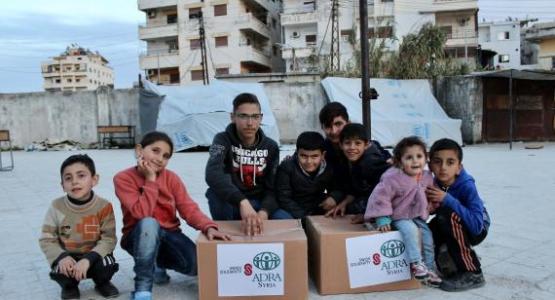
ADRA Calls on Nations to Bring Hope to All People Fleeing From Conflict and Persecution
Story by Iris Argueta
The Adventist Development and Relief Agency (ADRA) joins global communities in marking World Refugee Day on June 20 and observing World Refugee Sabbath on June 17, to honor millions of families, women, children, and individual people forced to flee their homes due to conflict, persecution, other forms of violence, and climate change.
According to the latest United Nations Refugee Agency Global Trends Report, more than 117 million people are forcibly displaced worldwide, including over 29.3 million refugees, 61.2 internally displaced people (IDPs), 5.6 million asylum seekers, and 5.6 million other people in need of international protection. (*Numbers are subject to change daily.)
"Every action matters in the lives of refugees and other displaced people struggling to survive in the absence of basic necessities such as food, shelter, and safety. We cannot turn a blind eye or remain silent in the face of their anguish. World Refugee Day serves as a reminder that we must all work together to end the difficulties and adversities that millions of refugees and host communities face," says ADRA International President Michael Kruger. “As ADRA celebrates its 40th anniversary this year, our global organization remains devoted to providing life-saving humanitarian services to refugees and displaced persons, women, children, and families around the world. Let us mark World Refugee Day and World Refugee Sabbath with justice, compassion, and love to achieve a brighter future for all, regardless of where they come from or what they have endured, so that all may live as God intended."
In 2000, the United Nations established the annual June 20th International World Refugee Day to commemorate the 50th anniversary of the 1951 Convention Relating to the Status of Refugees. The Seventh-day Adventist Church also launched World Refugee Sabbath in 2016, which is held on the Saturday preceding World Refugee Day, to encourage the faith community to actively participate in raising public awareness of the hardships of refugees.
ADRA has created resources such as children's stories, conversation guides, and even recipes to help broaden the understanding of refugees and encourage faith-based groups, communities, and other organizations to get involved in addressing the global refugee crisis. Download the materials by visiting ADRA.org/WorldRefugeeSabbath.
Click here to view a video on refugee families who have been assisted by ADRA globally.
“We invite people across the world to reflect on the global refugee crises and make a personal commitment to helping them. Use ADRA's resources to learn more; welcome parents and children escaping danger to your cities and towns by giving refuge and assistance,” says Herma Percy, Ph.D., director of advocacy for ADRA International. “Get inspired by their stories of resilience and fortitude and explore volunteer opportunities and ways to support refugee families. The more we learn, the more we will be able to create a more just world for everyone.”
ADRA has been working for decades to aid refugees and other people affected by disasters, conflict, and other crises. The global agency is currently supporting displaced families in over 40 nations, including Syria, Brazil, Colombia, Yemen, Bangladesh, South Sudan, Afghanistan, and Uganda. Programs include emergency food and shelter, education, health care, and livelihood support. The organization has also been at the forefront of efforts to integrate refugees and other displaced people into their local communities, promoting social cohesion, and reducing tensions and conflicts.
Fast Facts
- Refugees are people who have been forcibly displaced from their home country due to persecution, war, or violence.
- IDPs, or internally displaced persons, are people who leave their homes due to persecution, war, or violence but remain within their own country.
- Asylum seekers are people who seek international protection but whose refugee status has not yet been determined.
- 117 million Refugees (displaced and stateless people).
- 61.2 million IDPs.
- 5.6 Asylum Seekers.
- 72 percent of refugees come from Syria, Venezuela, Ukraine, Afghanistan, and South Sudan.
- 50 percent of the global refugee population are children.
(*Data from UNHCR's estimations.)

Add new comment